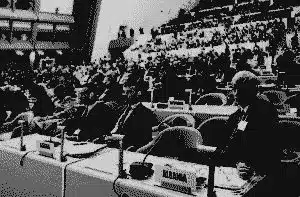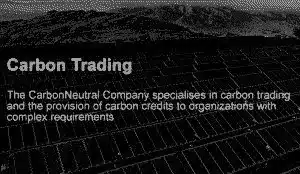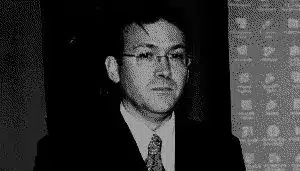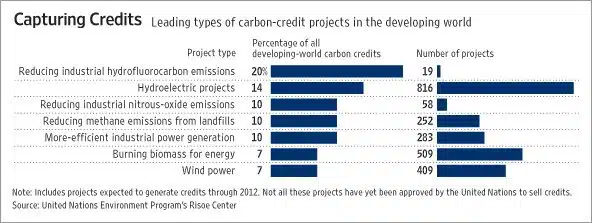by Doug Ross
It was all about money and power — and nothing to do with the environment
“This was the moment when the rise of the oceans began to slow, and our planet began to heal.” — Barack Obama, 3 June 2008
In the late nineties, members of the UN’s International Panel on Climate Change (IPCC) were tasked with assessing the scientific validity of the Kyoto Protocol.
The Protocol was an international emissions reduction treaty that required signatories to cut overall greenhouse gas emissions.
The IPCC subsequently produced the Special Report on Land Use, Land Use Change, and Forestry.
The report found that “carbon offsets” and “carbon trading” were viable ways to barter the right to pollute because they would fund new forestry initiatives.
But one critical detail was never disclosed in the report.
That is: members of the IPCC, such as Pedro Moura-Costa (above) and Gareth Philips, had major conflicts-of-interest. They owned, created and/or worked for businesses — such as Ecosecurities and SGS Forestry — that would directly profit from the report’s conclusions.
In fact, the IPCC panel members’ companies were positioned to earn millions of dollars from the report. But the mainstream media did not report these conflicts and instead piled on the “global warming” and “carbon offset” bandwagons.
Solar energy portal Ecotopia reported that members of the IPCC “…had vested interests in reaching unrealistically and unjustifiably optimistic conclusions about the possibility of compensating for emissions with trees… [and] should have been automatically disqualified from serving on an intergovernmental panel charged with investigating impartially the feasibility and benefits of such ‘offset’ projects.”

The IPCC panel consisted of:
* Richard Tipper of the Edinburgh Centre for Carbon Management (ECCM), a consulting company deriving revenue from carbon-absorption forestry projects. According to Ecotopia, “ECCM works closely with Future Forests… Tipper helped form ECCM some months after being appointed to the LULUCF panel.”
* Mark Trexler, a founder of Trexler & Associates, a pioneering firm “poised to make millions of dollars by promoting and monitoring carbon sequestration and other ‘climate mitigation’ projects.”
* Pedro Moura-Costa, an executive of Ecosecurities Ltd., a consulting firm specializing in the “generation of Emission Reduction Credits” from carbon-offseting activities. Ecosecurities has offices in the US, the UK, Brazil, Australia and The Netherlands.
* Gareth Philips of SGS Forestry, a division of the Societe Generale de Surveillance (SGS) of Geneva, the world’s largest inspection, auditing and testing company. SGS Forestry derives revenue from its carbon forestry projects. SGS certifies Costa Rica’s carbon offsets and “hopes to expand its work.”
* Sandra Brown of Winrock International, an Arkansas-based organization which accepts contracts from “public and private” sources. Winrock “provides forest carbon monitoring technical services to U.S. government agencies and a wide range of private sector and non-governmental organizations. “
* Peter Hill of Monsanto Corporation, which has a “large stake in genetically modified organisms, including, potentially, organisms modified to take up or store carbon more efficiently.”
The World Rainforest Movement investigated these bizarre financial ties, and concluded that the IPCC report “must now be shelved due to their clear conflict of interest and a new report instigated which will be free of the taint of intellectual corruption.”
In short, the very authors of the original UN climate report that justified the carbon market were themselves poised to profit from that market.
And if any of us thought the corruption in the UN ended with the “Oil-for-Food” scandal, it appears we were all sadly mistaken. The UN had no right doing business with any of these firms. By continuing to do so, they are reinforcing America’s image of the organization: that it is utterly useless and thoroughly infested with corrupt officials.













I’m still waiting for the ice age that this bunch was hustling in the 70s.
As always, follow the money. Then there’s Franklin Raines the former head of FreddieMac who had a major role in the subprime mortgage scandal hand forced to resign and pay back millions of dollars he fraudulently took as bonuses. He should have gone to jail. But good old Franklin Raines owns the patent so will make billions on that crooked… Read more »
It’s all bullshit.